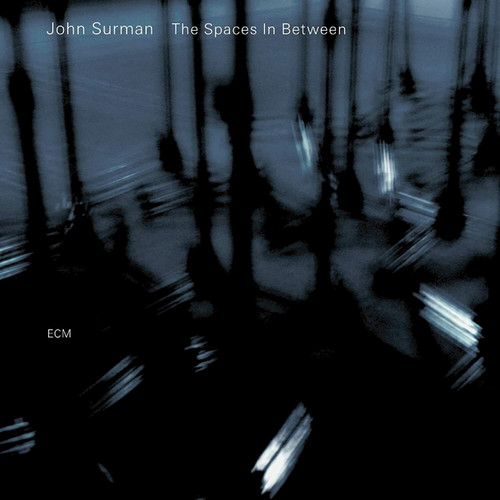John Surman’s new music for brass choir and improvising reeds and drums. Classical ensemble London Brass joins the Surman/DeJohnette duo in a live recording from London’s South Bank. An exciting disc that has affinities with other Surman-composed projects including “Coruscating” and “Proverbs and Songs”.
Tracklist:
1 Preamble 4:11
2 Groundwork 9:33
3 Sea Change 10:14
4 Back And Forth 11:51
5 Fire 6:47
6 Debased Line 5:02
7 In The Shadow 6:56
8 Free And Equal 8:47
9 Epilogue 3:42
Bass Trombone – David Stewart
Drums, Piano – Jack DeJohnette
Ensemble – London Brass
French Horn [Horn] – Richard Bissill
Soprano Saxophone, Baritone Saxophone, Bass Clarinet, Composed By – John Surman
Trombone – Dan Jenkins, Richard Edwards
Trombone, Euphonium – David Purser
Trumpet – Andrew Crowley, John Barclay, Paul Archibald
Trumpet, Flugelhorn – Anne McAneney
Tuba – Owen Slade
BACKGROUND
On the occasion of the premiere performance of his oratorio “Proverbs and Songs” in 1996, The Times wrote that “John Surman confirmed that he should no longer simply be recognised as one of the country’s leading improvisers and instrumentalists, but a choral composer of imagination, vision and power.” In “Free and Equal”, a “choral” role is assigned to brass instruments, and, as principal soloists John Surman and Jack DeJohnette – musical collaborators for 35 years now – move together, intuitively, through Surman’s often radiant writing for brass choir.
Taped in the summer of 2001 at the Queen Elizabeth Hall on London’s South Bank (during a concert chosen to open the Meltdown Festival by Robert Wyatt, then the festival’s artistic director), “Free and Equal” follows hard on the heels of another live Surman/DeJohnette recording, “Invisible Nature”. Where that duo disc was concerned almost exclusively with spontaneous improvisation, “Free and Equal” places much, but by no means all, of its emphasis on the written. With players like these, it’s wise to be cautious about strict demarcation of working means. For John Surman, improvising is also a ‘compositional’ method, and ‘free’ for him has never signalled purely textural exploration. His instincts as a player have always lent his solos a structural logic, and whether he’s playing at roaring intensity or tenderly scooping lyrical motifs from the ether, his improvising always reveals a sense of form and development. An experimentalist with a strong feeling for traditions, when Surman plays the world of folk song – as well as the jazz tradition – often seems proximate. He was a choirboy himself before he took up first the clarinet and then the baritone: it’s fair to say that he has always been a singer. And for decades now, his unique melodic gifts have been deployed in contexts that may or may not involve pre-prepared material. In DeJohnette he has a remarkable partner, a drummer who also thinks and hears melodically as well as rhythmically.
“Free And Equal”, on which Surman and DeJohnette are joined by the classical ensemble London Brass, belongs to the line of Surman ECM projects that includes “Proverbs and Songs”, with the Salisbury Festival Chorus under Howard Moody, and John Taylor on the church organ, and “Coruscating” with the Trans4mation String Quartet and bassist Chris Laurence. While it’s correct to say, with The Times, that these projects do attest to Surman’s growth as a composer, it’s also important to understand that one role of the written material in these pieces is to give new impetus to the improvising, just as one role of the improvising is to colour, underline or shade the structural elements and transform them.
As Surman says, “I’m fascinated by the way in which improvisation can change the structure, in the same way as the time of the day and the way the light strikes the mountain can change the character of the mountain.”
There is, then, an organic quality to these works. No performance or recording of them can be considered definitive, for, like all “jazz”, they remain works-in-progress: not only is the improvised component constantly in flux, but Surman continues to add new sections to them and the works in turn imply new compositions. “Coruscating” for instance has led to pieces for string orchestra.
For the roots of “Free and Equal” we have to go back to 1990 when John Surman and Jack DeJohnette premiered new music in a collaboration with the Balanescu Quartet. Surman felt that there was much potential in setting the finely-honed improvisational understanding of his duo with DeJohnette in a chamber context but practical sound balance and dynamic considerations handicapped the drummer particularly. Unless he played with brushes continuously the string quartet was obliterated. Seeking instrumentation that could match the duo’s volume and punch, Surman contemplated preparing music for brass quartet firstly, but after the ten-piece London Brass ensemble expressed interest in collaboration, he was happy to write for one of his favourite instrumental aggregates, the brass choir.
Formed in 1985 as an extension of the renowned Philip Jones Brass Ensemble (whose history goes back to 1951), London Brass continues to embrace the works of composers such as Bach, Gibbons and Gabrieli, but their repertoire is increasingly geared to new music, including both contemporary composition and jazz. They recently premiered Harrison Birtwistle’s “Sonance” at St Paul’s Cathedral, and in the same season as the work with Surman and DeJohnette featured music of Birtwistle and Takemitsu in their London Proms concert at the Royal Albert Hall. Composers who have written for the group include Micheal Nyman, Mark Anthony Turnage, Richard Rodney Bennett and Michael Gibbs.
Ensemble trombonists Richard Edwards and Dave Stewart had previously played with the The Brass Project, the group which Surman co-led for many year with John Warren (see the 1992 ECM recording), and brought Surman’s writing to the attention of London Brass. In plotting the dramaturgy of “Free and Equal”, Surman kept his old comrades’ abilities also in mind.
“The ensemble sections are all notated, but from the outset I knew that Jack and I would essentially improvise our way through the whole work, and that some of the London Brass would be able to join us in the improvising, and left spaces accordingly.”
Apart from the first two movements, where the piano part for DeJohnette is written, the drummer had carte blanche to approach the material any way he wanted to. “I didn’t know in advance whether Jack would play rhythmically or more freely, or whether he’d play percussion, or what his choice of instruments would be. Nor did I give myself too much in the way of thematic material. I let myself be free, to respond to what was going on around me.”
The connecting sections in “Free and Equal” are improvisations guided by Surman, often following directions implied by the written signposts along the way. More than “links”, these sections are developments of the material, leading in and out of the structured ensemble sections and shaped by what has been as well as what lies ahead. Although they have quite a different character from either “Invisible Nature” or the manifesto that was 1981’s “The Amazing Adventures of Simon Simon”, much of the flair and fire of the Surman/DeJohnette duo is evident in these interludes. Trombonist Richard Edwards and trumpeter John Barclay also make powerful contributions here, as does horn player Richard Bissill, whose improvising capacity Surman became aware of only in the course of rehearsals…






